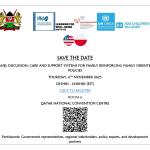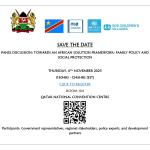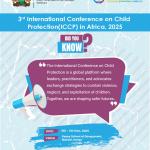Counter Trafficking In Persons
Background Information
Kenya ratified the United Nations Protocol to Prevent, Suppress and Punish Trafficking in Persons, Especially Women and Children, on 5th January 2005. This is one of the three Protocols that supplement the United Nations Convention on Transnational Organized Crime.
In 2005, the then Department of Children Services (now State Department for Children Services (SDCS)) noted an increase in the reported cases of child trafficking. This prompted the Directorate and stakeholders to put in place strategies to address issues of child trafficking leading to their mainstreaming into the Directorate’s Strategic Plan.
A National Steering Committee under the ministry in charge of children affairs was established to spearhead counter-trafficking in person’s efforts in May 2007. The committee membership included relevant government ministries, international and local non-governmental organizations, and faith-based organizations.
The priority for the committee was to put in place a legal framework to counter trafficking in persons. In 2010, the Counter-Trafficking in Persons Act was enacted. The Act was gazetted for commencement on 1st October 2012 under Legal Notice No. 99 of 2012.
The Counter Trafficking in Persons Act established two bodies – the Counter Trafficking in Persons Advisory Committee and the National Assistance Trust Fund for Victims of Trafficking in Persons.
Counter Trafficking In Persons Advisory Committee
The Counter Trafficking in Persons Advisory Committee (AC) comprises of representatives of state and non-state agencies dealing with trafficking in persons. The committee has been operational since its inception in 2017 and continues to discharge its mandate as contained in the Act, section 20.
Membership of the Counter Trafficking in Persons Committee is as follows:
- PS in charge of Immigration Services
- PS in charge of Foreign Affairs
- PS in charge of Children matters
- PS in charge of Labour
- The Attorney General
- The Inspector General of Police
- Kenya National Commission on Human rights
- Federation of Kenya Employers
- COTU
- Two Representatives of civil society organizations – currently Counter Human Trafficking Trust East Africa (CHTEA) and TRACE Kenya.
- The Director of Public Prosecutions (co-opted)
- The Director-General National Employment Authority (co-opted)
- The Secretariat is provided by the Directorate of Children Services
The main function of the Advisory Committee is to advise the Cabinet Secretary on inter-agency activities aimed at combating trafficking in persons and the implementation of preventive, protective and rehabilitative programmes for trafficked persons.
Functions of the Advisory Committee
- Formulation of a comprehensive and integrated program to prevent and suppress the trafficking in persons;
- Coordination of policies and programmes of the agencies to effectively address the issues and problems attendant to trafficking in persons;
- Coordination of the dissemination of information on the law and the issues relating to trafficking in persons through concerned agencies and non-governmental organizations;
- Formulation of programmes for the reintegration of both locally and internationally trafficked persons;
- Monitoring and evaluation of the progress of Kenya with respect to prevention, protection and prosecution efforts relating to trafficking in persons;
- Compilation and documentation of data and information on cases of trafficking in persons for purposes of policy formulation and program direction;
- Development of mechanisms to ensure the timely, coordinated, and effective response to cases of trafficking in persons;
- Measures to enhance cooperative efforts and mutual assistance between Kenya and other countries through bilateral and multilateral arrangements to prevent and suppress international trafficking in persons;
- Mechanisms to screen persons entering or leaving Kenya to determine if they are victims of trafficking in persons;
- information campaigns against trafficking in persons;
- Establishment of and support community-based initiatives that address trafficking in persons;
- Implementation of effective pre-employment orientation seminars and pre-departure counselling programmes to applicants for overseas employment;
National Assistance Trust Fund for Victims of Trafficking in Persons
The National Assistance Trust Fund for Victims of Trafficking in persons is established under Section 22 of the Counter Trafficking in Persons Act 2010. It is administered by the Board of Trustees.
Composition of the Board of Trustees
- The Chairman of the Advisory Committee;
- the Permanent Secretary of the Ministry responsible for gender and children;
- A representative of the Ministry responsible for gender and children, appointed by the Minister, who shall be the Secretary;
- A representative of the Ministry responsible for finance, appointed by the Minister responsible for finance;
- One person conversant with issues relating to trafficking in persons; and
- One person with experience in financial management, who shall be the treasurer of the Board of Trustees.
(2) The members of the Board of Trustees under subsection (1)(e) and (f) are appointed by the Cabinet Secretary, by notice in the Gazette, for a term of three years and shall be eligible for reappointment at the expiry of the term.
Functions of the Trust Fund:
To support and protect of victims of trafficking in persons through: -
(a) return to and from Kenya;
(b) resettlement;
(c) re-integration;
(d) appropriate shelter and other basic needs;
(e) psychosocial support;
(f) appropriate medical assistance;
(g) legal assistance or legal information, including information on the relevant judicial and administrative proceedings; or
(h) any other necessary assistance that a victim may require.



